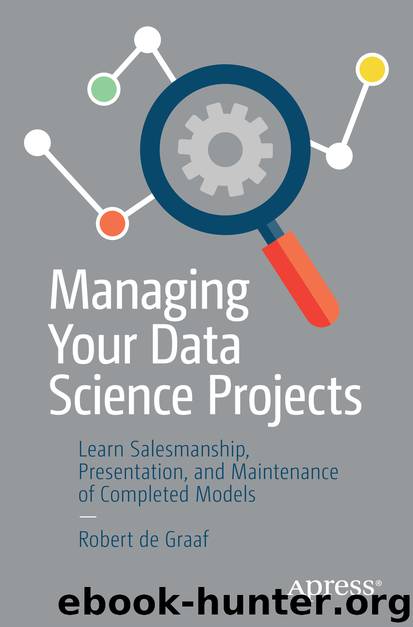Managing Your Data Science Projects by Robert de Graaf

Author:Robert de Graaf
Language: eng
Format: epub
ISBN: 9781484249079
Publisher: Apress
Earning Trust
The highest state you can aspire to in a relationship with the people you are trying to assist is to be trusted. Trust is what ensures that your organization comes to you early with problems that need your help to solve, ensures that they give your solutions a fair hearing and implement them without trying to prove that they won’t work first.
Earning the trust of your customers and clients takes the idea of a personal brand further. Although trust is earned repeatedly within each new relationship, it is a deeper level of engagement than having a personal brand and provides a firmer foundation for future work.
Just as for the previous sections, this needs to be done with an eye on promoting people to trust your team and to trust data science as a profession that will aid their company. Trust in either yourself as an individual or trust in the idea of data science by themselves won’t be sufficient to ensure they trust your solutions to their problems.
In a later chapter we will see that ensuring that users trust your models is of paramount importance for them to be used. If your users are able to trust you on a personal level, or the model is presented to them by someone they respect who trusts you on a personal level, you will have crossed an important barrier for achieving your user’s trust in your model.
At the same time, it is more difficult to get your clients to trust you than it is to get them to trust your model—it’s just that if you are successful in getting them to trust you the pay-off is that you need to re-earn that trust every time you want to propose a new model.
Building that trust is something that will take place over a longer period of time, with a different approach. The point here is not that you provide models that do what they say on the tin by attaining a good accuracy measure or even that the models you provide develop a reputation for significantly improving the organization’s smooth running.
The famous book on building trust for consultants, The Trusted Advisor,10 defines four ingredients for personal trust—credibility, reliability, intimacy, and self-orientation. A lot of this book has to do with the first two, as these elements can apply to statistical models as well as to humans. The last two really only apply to people.
More generally, the authors of The Trusted Advisor are keen to point out that although credibility and reliability have a black and white, technical dimension (which is what I have covered in relation to models in other chapters of this book) they also have an important emotional dimension, which will not map so easily onto models, but is important for your personal credibility when trying to win over your clients or potential users.
Intimacy can be seen as more difficult to achieve than either credibility or reliability. To be credible, you just need to know your stuff. To be seen
Download
This site does not store any files on its server. We only index and link to content provided by other sites. Please contact the content providers to delete copyright contents if any and email us, we'll remove relevant links or contents immediately.
| Access | Data Mining |
| Data Modeling & Design | Data Processing |
| Data Warehousing | MySQL |
| Oracle | Other Databases |
| Relational Databases | SQL |
Algorithms of the Intelligent Web by Haralambos Marmanis;Dmitry Babenko(18334)
Azure Data and AI Architect Handbook by Olivier Mertens & Breght Van Baelen(7693)
Building Statistical Models in Python by Huy Hoang Nguyen & Paul N Adams & Stuart J Miller(7684)
Serverless Machine Learning with Amazon Redshift ML by Debu Panda & Phil Bates & Bhanu Pittampally & Sumeet Joshi(7550)
Driving Data Quality with Data Contracts by Andrew Jones(7327)
Data Wrangling on AWS by Navnit Shukla | Sankar M | Sam Palani(7314)
Machine Learning Model Serving Patterns and Best Practices by Md Johirul Islam(7044)
Learning SQL by Alan Beaulieu(6290)
Weapons of Math Destruction by Cathy O'Neil(6279)
Big Data Analysis with Python by Ivan Marin(5970)
Data Engineering with dbt by Roberto Zagni(4951)
Solidity Programming Essentials by Ritesh Modi(4589)
Time Series Analysis with Python Cookbook by Tarek A. Atwan(4422)
Pandas Cookbook by Theodore Petrou(4105)
Blockchain Basics by Daniel Drescher(3582)
Natural Language Processing with Java Cookbook by Richard M. Reese(3170)
Hands-On Machine Learning for Algorithmic Trading by Stefan Jansen(3072)
Learn T-SQL Querying by Pam Lahoud & Pedro Lopes(2961)
Feature Store for Machine Learning by Jayanth Kumar M J(2943)
